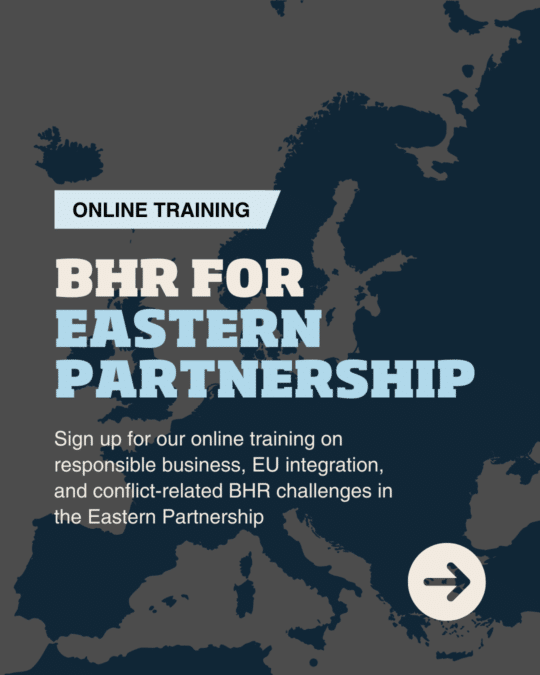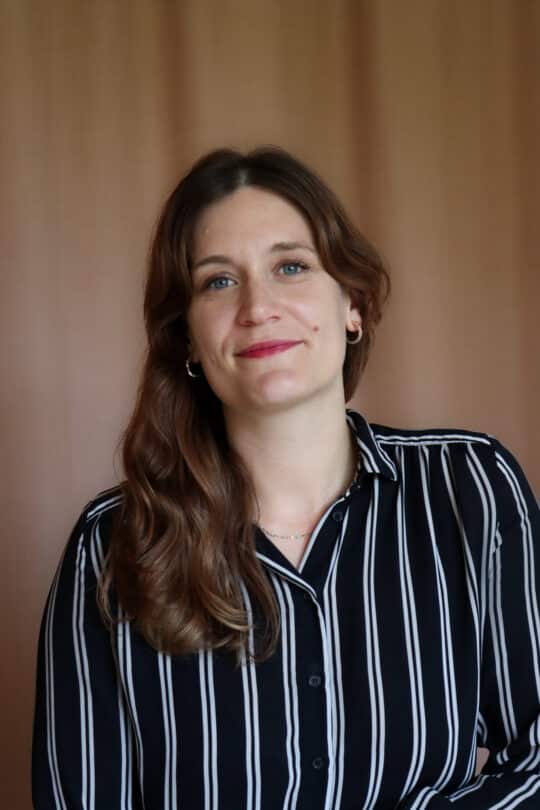
FACILITATING BUSINESS AND HUMAN RIGHTS IN UKRAINE
Swedwatch has been granted nearly 1.7 million SEK in project support from the Swedish Institute to work on projects in Ukraine over the next two years. One project focuses on responsible business conduct, while the other aims to strengthen cooperation on corporate responsibility within the Eastern Partnership.
“We look forward to collaborating with partner organisations in Ukraine and further developing the dialogue on how businesses can take responsibility for human rights and the environment, both during and after the war. The reconstruction efforts in Ukraine are already underway, and companies and investors must get it right from the start”, says Alice Blondel, Director at Swedwatch.
Sweden’s aid to Ukraine primarily consists of humanitarian support and civil crisis management. Support is also provided for reform efforts and reconstruction, including assistance in strengthening democratic governance, EU integration, and essential public services such as education and healthcare. As part of this effort, Swedwatch, in collaboration with Ukrainian partners, will develop expertise in corporate responsibility, sustainability, and human rights.
“Businesses play a central role in Ukraine’s reconstruction. At the same time, there are many risks and challenges associated with corporate activities during and after armed conflict”, says Jessica Johansson, Project Manager at Swedwatch.
The Swedish Institute has granted Swedwatch a total of 1.7 million SEK for two different projects over a two-year period. One project focuses on promoting responsible business practices during crises and conflicts, while the other aims to strengthen knowledge exchange and collaboration on corporate responsibility within the Eastern Partnership. The projects are carried out in cooperation with various partners 👇🏼.
Project 1: Responsible business conduct in crisis and conflict
Aim: Identify risks and integrate responsible business practices into various reconstruction processes in Ukraine, as well as to strengthen the National Contact Point for Responsible Business Conduct (NCP).
Partners: Yaroslav Mudryi National Law University (NLU), the Ukrainian human rights organisation Social Action Centre ant the NCP at Ukraine’s Ministry of Economy.
Activities: Develop guidelines for responsible business conduct within crucial sectors, with a particular focus on due diligence – i.e. analyzing risks of human rights violations – along with roadmaps for Ukrainian companies, EU businesses, investors, civil society organizations and authorities. The project will also work to strengthen the National Contact Point (NCP) in Ukraine (see more below).
Key sectors: The Ukrainian government has identified several key sectors for reconstruction, including agriculture and food production, construction, transport and logistics, IT and digitalization, critical raw materials, and energy.
“From previous research and reporting, we know that many of the sectors identified as crucial for reconstruction are high-risk sectors in terms of human rights and environmental concerns. This makes it particularly important to uphold human rights and responsible business conduct”, says Jessica Johansson, Swedwatch.
About National Contact Points (NCPs)
Countries that have adopted the OECD Guidelines for Responsible Business Conduct are obliged to establish NCPs, with the aim to promote and monitor compliance. The NCPs also serve as non-judicial bodies where stakeholders can report companies suspected of violating the guidelines. While NCPs cannot overturn court decisions, they can issue recommendations and mediate between parties.
Each member country is free to organize its NCP as it sees fit. For example, the Swedish NCP operates as a tripartite collaboration between the government, businesses, and workers’ organizations.
Project 2: Strengthening corporate responsibility in the Eastern Partnership
Aim: Exchange of experiences and collaboration on corporate responsibility within the Eastern Partnership, in the context of both the ongoing war and reconstruction efforts in the region, as well as reforms (adapted legislation and standards) that can bring partner countries closer to the EU.
Partners: A collaboration with partner organizations from Ukraine, Moldova, and Georgia. The project is led by Östgruppen, other partners include Yaroslav Mudryi National Law University (NLU), UN Global Compact Network Georgia, Public Association Institute for Business and Human Rights of the Republic of Moldova (IBHR Moldova) and Friedrich-Alexander University Erlangen-Nürnberg in Germany.
Activities: Among other multi-stakeholder meetings in order to develop a roadmap for responsible business conduct within the Eastern Partnership and digital training sessions👇🏼.
Academia has been a key driver of the business and human rights agenda in Ukraine. For the past eight years, National Law University has been proud to partner with the OECD NCP in Ukraine and witness significant progress in advancing BHR initiatives across the country. /Olena Uvarova Research, project partner and Chair of the International Lab on BHR at National Law University.
Contact
Jessica Johansson, Program Officer, Swedwatch
+46 (0)73 376 39 73
jessica@swedwatch.org

